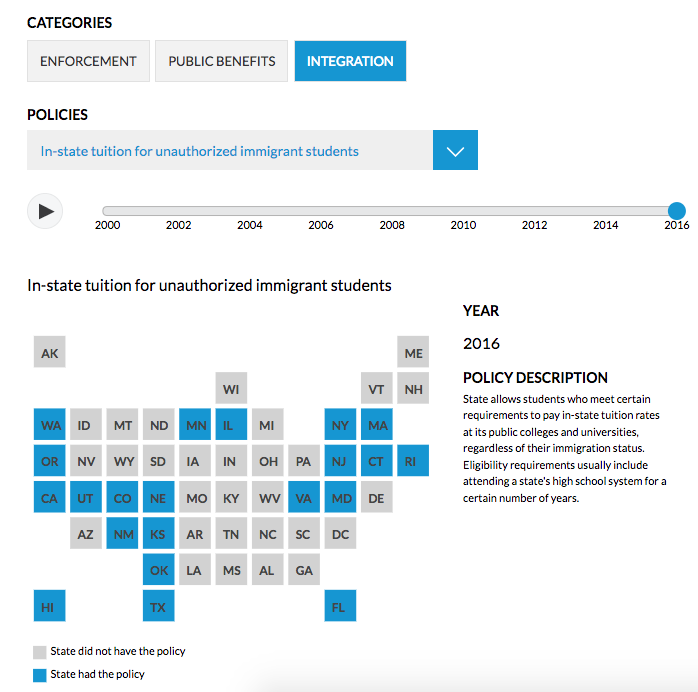Connecting state and local government leaders
The Urban Institute has a new data tool showing trends in immigration policies across states over time.
States and localities cooperating with federal immigration enforcement cause low-income immigrant households with children “small but significant increases in material hardship,” according to a new Urban Institute report.
That includes households headed by undocumented immigrants and authorized ones alike, affecting their more than 7 million children—5.9 million of whom are U.S. citizens.
Secure Communities and 287(g) task force agreements have the harshest impacts—possibly creating a “climate of fear” that hinders the economic success of all immigrants—without benefitting citizens, per the report:
In the short-term increased material hardship means children and parents experience financial stress, sometimes go without basic necessities like electricity or heat, experience housing instability due to missed rent payments, or go without needed medical care. Over the long term, material hardship has negative implications for children’s cognitive and physical development.
Started in 1996 and first implemented in 2002 by the Florida Department of Law Enforcement, 287(g) agreements allow state and local law enforcement officers to be trained and deputized to enforce federal immigration law. But they’ve fallen out of favor with the decline of task forces.
Secure Communities was a Bush-era initiative checking arrestee fingerprints against FBI and Department of Homeland Security Databases, alerting Immigration & Customs Enforcement to undocumented immigrants the agency could request to be detained. The nonbinding nature of detainers saw the program replaced in 2014 with the Priority Enforcement Program, targeting national security threats convicted of serious crimes and new arrivals.
Both Secure Communities and 287(g) agreements were revived within President Trump’s executive order.
For every new immigration enforcement policy a state adopted between 2005 and 2010, undocumented immigrant households experienced a 4 percentage point increase in the number unable to afford basic expenses; 3 percentage point increase in the number that couldn’t pay their rent, mortgage or were evicted; and a 6 percentage point increase in the number that couldn’t pay utilities or had them shut off.
Georgia and Virginia both adopted four such policies, increasing housing hardship by an estimated 11 percentage points.
By comparison, authorized immigrant households saw a 2 percentage point increase in the number unable to afford basic expenses; 3 percentage point increase in the number that couldn’t pay their rent, mortgage or were evicted; 2 percentage point increase in the number that couldn’t pay utilities or had them shut off; and a 2 percentage point increase in the number unable to see a doctor or dentist.
Coupled with the report, Urban Institute launched a new data tool showing the popularity of 24 immigrant policies—categorized under enforcement, public benefit access and integration—between 2001 and 2016.
For instance, policies deputizing local law enforcement to enforce federal immigration laws went from being the norm in four to 21 states between 2005 and 2010. By 2015, only 11 states were enforcing such policies, though Trump hopes to change that peddling 287(g) task force agreements, per the report:
While these policies have the potential to meet their intended goals of increasing removals of unauthorized immigrants, local leaders may want to also consider the deleterious effects these policies can have on children in low-income immigrant families, most of whom are U.S. citizens, on legal immigrant households, and on broader communities.
Meanwhile, after a 2009 policy change, the number of states offering health insurance coverage to authorized, low-income immigrant children almost doubled from 16 to 30 as of 2016. The new Obama-era rules allowed states to use matching federal dollars from Medicaid and CHIP.

Since 2001, the number of states offering in-state tuition to undocumented immigrants that were educated in the state for a set amount of time rose from 2 to 10, after Texas and California pioneered such policies.
Dave Nyczepir is a News Editor at Government Executive’s Route Fifty and is based in Washington, D.C.

NEXT STORY: Survey Finds Frayed Relations in Michigan Between Local Governments and State




